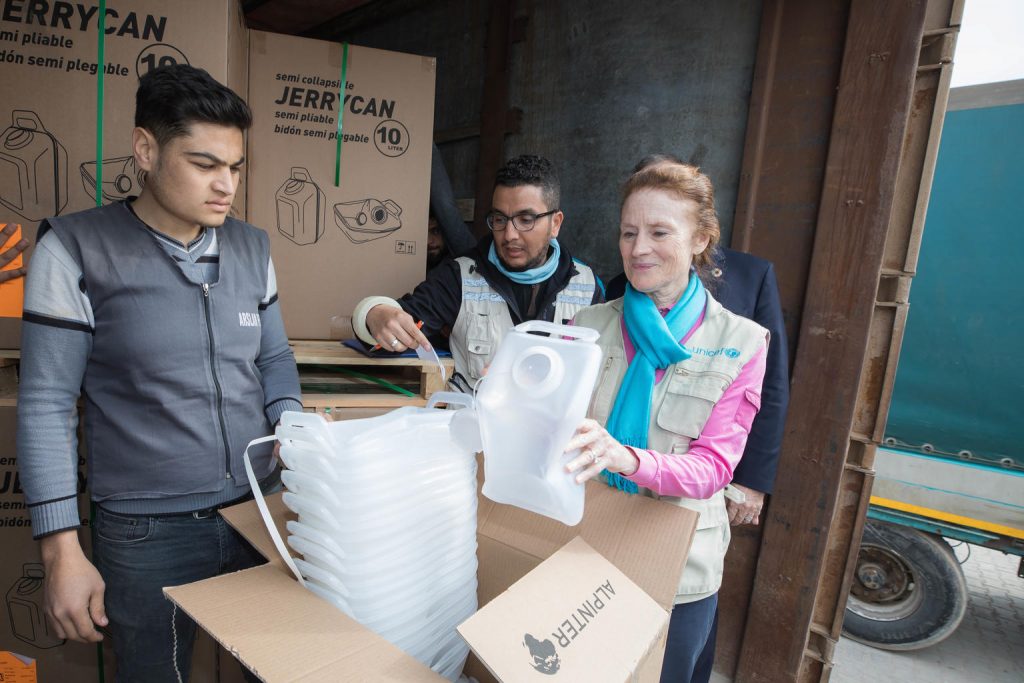UN launches global humanitarian response plan to COVID-19 pandemic
Remarks by UNICEF Executive Director Henrietta Fore (check against delivery)
NOTE: Multimedia assets here
NOTE: UNICEF Ireland Exec. Dir. Peter Power is available for interview on the impending global Covid-19 humanitarian crisis, and impact on children*

NEW YORK, 25 March 2020 – “In just a few months, COVID-19 has upended the lives of children around the world. Hundreds of millions are not in school. Parents and caregivers have lost their jobs. Borders have been closed.
“Children are the hidden victims of this pandemic. We’re worried about its short- and long-term impacts on their health, well-being, development and prospects.
“We’re worried about their lack of access to water and hygiene services. As you know, washing hands with soap is critical in the fight against COVID-19. And yet, 40 per cent of the world’s population – or 3 billion people – do not have a handwashing facility with water and soap at home.
“Even worse, 16 per cent of healthcare facilities, or 1 in 6, do not have hygiene services. And over one-third of schools worldwide and half of schools in the least-developed countries have no place for children to wash their hands at all.
“We’re worried about their education. More than half of the world’s students have been affected by nation-wide school closures in at least 120 countries.
“We hope that most of these students will resume their learning as soon as the situation improves. However, we know from experience that for vulnerable children, the longer they stay away from school the less likely they are to return.
“These closures are not only limiting access to learning — but to school nutrition, health programs, clean water and accurate information.
“That’s why UNICEF is working with education ministries around the world to identify alternative learning opportunities, whether learning classes online or through radio and TV programmes.
“We have also issued guidance, along with WHO and IFRC, to advise parents, teachers, school administrators and others on how to keep children learning while keeping them safe.
“We’re worried about children’s protection. We know from previous health emergencies that children are at heightened risk of exploitation, violence and abuse when schools are closed, jobs are lost, and movement is restricted.
“For example, school closures during the Ebola outbreak in West Africa from 2014 to 2016 resulted in spikes in child labor, neglect, sexual abuse and teenage pregnancies.
“We’re worried about their access to basic health services, including immunization and the treatment of childhood diseases. We cannot save a child from COVID-19, and then lose many to pneumonia, measles and cholera.
“We’re worried about their mental health. Children and young people are missing out on some of the best moments of their young lives — chatting with friends, participating in class, and enjoying sports. This increases anxiety and can cause changes in behavior. We have put out guidance for parents, teachers, and children and young people to help them cope during these challenging times. Depression and mental health are real, and are affecting one in three of us.
“We’re particularly worried about the millions of children on the move or living through conflicts. For them, the consequences of this pandemic will be unlike any we have ever seen. These children live in overcrowded conditions, often in active war zones, with limited or non-existent access to health care. A family of six, eight, ten or 12 can be living in one room. Self-isolation and handwashing with soap will not be easy in such environments.
“That’s why funding this global humanitarian response plan for COVID-19 is so essential.
“UNICEF alone is appealing for US $405 million for our response in emergency countries. We are also seeking an additional $246.6 for our response in non-emergency countries.
“So our total appeal is for US $651.6 million.
“With support from the international community, we can, together, shore up preparedness and response plans in countries with weaker healthcare systems
“We can ramp up access to proper handwashing and sanitation services.
“We can expand our engagement with communities to provide the information they need to avoid contagion.
“We can maintain a steady flow of personal protection equipment — such as gowns, masks, goggles and gloves — to support infection prevention and control while keeping our essential, hard-working health workers safe.
“And we can continue working with governments to strengthen protection services, psychosocial support and remote learning opportunities for all the children, and particularly for the most vulnerable children.”
ENDS
###




